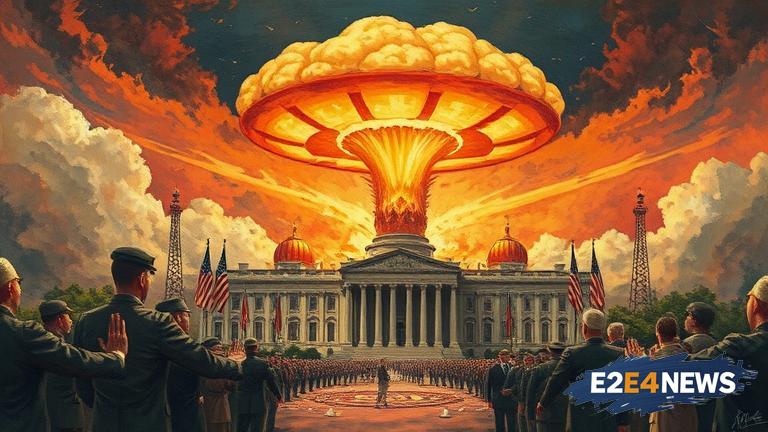The atomic bombing of Hiroshima and Nagasaki in 1945 has been a topic of intense debate among historians and scholars. Rich Lowry’s recent opinion piece argues that President Harry Truman made the right decision in dropping the bomb, citing the potential loss of lives that would have occurred if the Allies had invaded Japan. This perspective is rooted in the idea that the bomb was a necessary evil, as it brought a swift end to World War II and prevented further bloodshed. On the other hand, critics of Truman’s decision argue that the bomb was a brutal and inhumane act that resulted in the deaths of hundreds of thousands of innocent civilians. They contend that alternative methods, such as a demonstration of the bomb’s power or a negotiated surrender, could have achieved the same outcome without the devastating consequences. Despite these criticisms, Lowry’s argument is supported by historical records, which suggest that the Japanese military was prepared to fight to the death, and that an invasion would have been a costly and bloody affair. The Allies had already suffered significant losses in the Pacific, and the prospect of invading Japan’s home islands was a daunting one. The bomb, in this context, was seen as a means to avoid a prolonged and brutal conflict. Furthermore, the Soviet Union’s declaration of war on Japan, which occurred just days after the bombing of Hiroshima, added to the pressure on Japan to surrender. The combination of these factors ultimately led to Japan’s capitulation, bringing an end to the war in the Pacific. In the years since, the bombing of Hiroshima and Nagasaki has become a symbol of the devastating consequences of war and the importance of diplomacy in preventing such conflicts. The debate surrounding Truman’s decision serves as a reminder of the complexities and nuances of historical events, and the need for careful consideration and analysis when evaluating the past. As the world continues to grapple with the challenges of international relations and global security, the legacy of the atomic bomb serves as a powerful reminder of the importance of cooperation and diplomacy. The decision to drop the bomb was not taken lightly, and it is clear that Truman and his advisors were deeply aware of the potential consequences of their actions. In the end, the bomb was seen as a necessary step to bring a swift end to the war, and to prevent further loss of life. While the debate surrounding Truman’s decision will likely continue, it is clear that the bombing of Hiroshima and Nagasaki was a pivotal moment in history, one that has had far-reaching consequences for international relations and global security. The use of the atomic bomb also raised important questions about the ethics of warfare and the use of weapons of mass destruction. In the years since, the international community has worked to establish norms and protocols for the use of such weapons, and to prevent their proliferation. The bombing of Hiroshima and Nagasaki serves as a powerful reminder of the importance of these efforts, and the need for continued cooperation and diplomacy in preventing the use of such weapons in the future. As the world looks to the future, it is clear that the legacy of the atomic bomb will continue to play an important role in shaping international relations and global security. The debate surrounding Truman’s decision will likely continue, but it is clear that the bombing of Hiroshima and Nagasaki was a pivotal moment in history, one that has had far-reaching consequences for the world. In conclusion, the decision to drop the atomic bomb was a complex and multifaceted one, driven by a range of factors including the desire to bring a swift end to the war and to prevent further loss of life. While the debate surrounding Truman’s decision will likely continue, it is clear that the bombing of Hiroshima and Nagasaki was a pivotal moment in history, one that has had far-reaching consequences for international relations and global security. The use of the atomic bomb raised important questions about the ethics of warfare and the use of weapons of mass destruction, and it is clear that the international community must continue to work towards preventing the use of such weapons in the future. The legacy of the atomic bomb serves as a powerful reminder of the importance of cooperation and diplomacy in preventing conflict and promoting global security. The world must continue to learn from the past and work towards a more peaceful and secure future, one in which the use of weapons of mass destruction is never again considered a viable option. The bombing of Hiroshima and Nagasaki was a tragic event, one that resulted in the loss of hundreds of thousands of lives and had far-reaching consequences for the world. However, it is also a reminder of the importance of diplomacy and cooperation in preventing conflict and promoting global security. As the world looks to the future, it is clear that the legacy of the atomic bomb will continue to play an important role in shaping international relations and global security. The debate surrounding Truman’s decision will likely continue, but it is clear that the bombing of Hiroshima and Nagasaki was a pivotal moment in history, one that has had far-reaching consequences for the world. The use of the atomic bomb was a complex and multifaceted issue, driven by a range of factors including the desire to bring a swift end to the war and to prevent further loss of life. While the debate surrounding Truman’s decision will likely continue, it is clear that the bombing of Hiroshima and Nagasaki was a pivotal moment in history, one that has had far-reaching consequences for international relations and global security.





